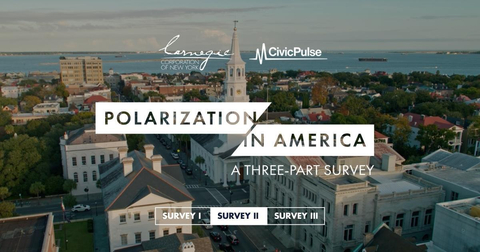Local government officials look for solutions by hosting community activities, selecting topics that address universal concerns, and framing discussions to emphasize benefits for all residents
The degree of polarization perceived by local leaders in their communities remains steady following the 2024 presidential election and the transition from the Biden administration to a second Trump administration in 2025, according to a new survey conducted by CivicPulse and commissioned by Carnegie Corporation of New York.
This press release features multimedia. View the full release here: https://www.businesswire.com/news/home/20250520792558/en/

The latest survey in the series Polarization in America: Survey of Local Government shows that local governments are navigating divisive challenges more successfully than their state or federal counterparts. They are also better at finding solutions that help reduce polarization’s most harmful effects.
The two surveys — conducted before and after the election — show that 31 percent of local government leaders see polarization as negatively affecting their communities. Most local government leaders — 83 percent — believe it is negatively affecting the country, a slight improvement over earlier results (87 percent).
The latest survey shows that local communities are more resilient to polarization and that particular political events appear to have less immediate influence over effects compared to changes in slower-moving social and institutional structures. While nearly a third of local communities still perceive the negative effects of polarization, an even higher percentage (40 percent) of local leaders of communities larger than 50,000 reported a negative impact.
“The finding that perceptions of political polarization are slow to change confirms the need for sustained commitments,” said Dame Louise Richardson, president of Carnegie, former head of the University of Oxford, and a distinguished political scientist. “Evidently local government leaders are looking for ways to foster more cohesive environments, and in so doing are providing examples for other communities.”
Between January and March 2025, CivicPulse surveyed almost 1,300 elected officials in local government, including members of city councils, county commissions, and school boards.
Key findings:
What are local communities doing to reduce polarization?
- 46 percent said hosting community events is effective in reducing polarization, 43 percent said informal meetings, and 38 percent said advisory committees or task forces.
- 48 percent said they choose to focus on certain policy topics that are universal, such as infrastructure, housing, and public safety for officials serving municipalities, counties, and townships; school board members selected student well-being and academics.
- 57 percent said they consider the challenge of polarization when choosing how to frame communications about their work, stressing community benefits, concrete outcomes, and evidence, while using neutral language.
Drawing on information in the first survey, the latest survey focuses on two types of experiences that can lead to greater civic participation and enduring changes in perspective: civics education in schools and extended volunteer experiences, including paid community service programs.
Do civics education and volunteerism decrease polarization?
- Two out of five school board members (38 percent) believe civics classes help reduce polarization while half (49 percent) do not perceive a difference. However, civics education is associated with greater civic participation, and 84 percent of high schools and 48 percent of K–8 schools offer some form of civics classes.
- 44 percent of local government leaders said long-term volunteering can reduce polarization, yet only 9 percent reported the presence of long-term, paid volunteering opportunities in their communities. Serving on boards and commissions and volunteering with parent-teacher organizations or in classrooms were the most common examples.
“There are an enormous number of local governments in the United States, and they vary widely in type and size,” said Nathan Lee, founder and managing director of CivicPulse. “This provides an amazing laboratory for democracy. There’s much to learn from what different local leaders are saying about what works and how these approaches may or may not scale to other communities, states, or even to the country as a whole.”
The survey used a mixed-methods approach of quantitative analysis of multiple-choice survey responses, qualitative and quantitative analyses of open-ended survey responses, and follow-up interviews with select respondents. Among the 1,274 local-leader respondents, 52 percent were elected policymakers (e.g. mayor, county legislator) and 48 percent were school board officials; 8 percent served in counties, 32 percent in municipalities, 12 percent in townships, and 48 percent in school districts; 37 percent identified as Democrat, 33 percent as Republican, and 30 percent as Independent.
Read and download the full report here. See the results of the first survey here.
About CivicPulse
CivicPulse is a nonprofit, nonpartisan research organization dedicated to enhancing local and state government in the United States by conducting representative surveys of public officials, producing actionable research, and facilitating practitioner-researcher dialogue.
About Carnegie Corporation of New York
Carnegie was established by Andrew Carnegie in 1911 to promote the advancement and diffusion of knowledge and understanding. Today the foundation works to reduce political polarization through philanthropic support for the issues that Carnegie considered most important: education, democracy, and peace. @CarnegieCorp
View source version on businesswire.com: https://www.businesswire.com/news/home/20250520792558/en/
Between January and March 2025, CivicPulse surveyed almost 1,300 elected officials in local government, including members of city councils, county commissions, and school boards
Contacts
Contact CivicPulse for more on the data, demographics, and survey methodology. Please email info@civicpulse.org.
Contact Carnegie for interviews or additional information. Celeste Ford | Chief Communications Officer | CFC@carnegie.org



